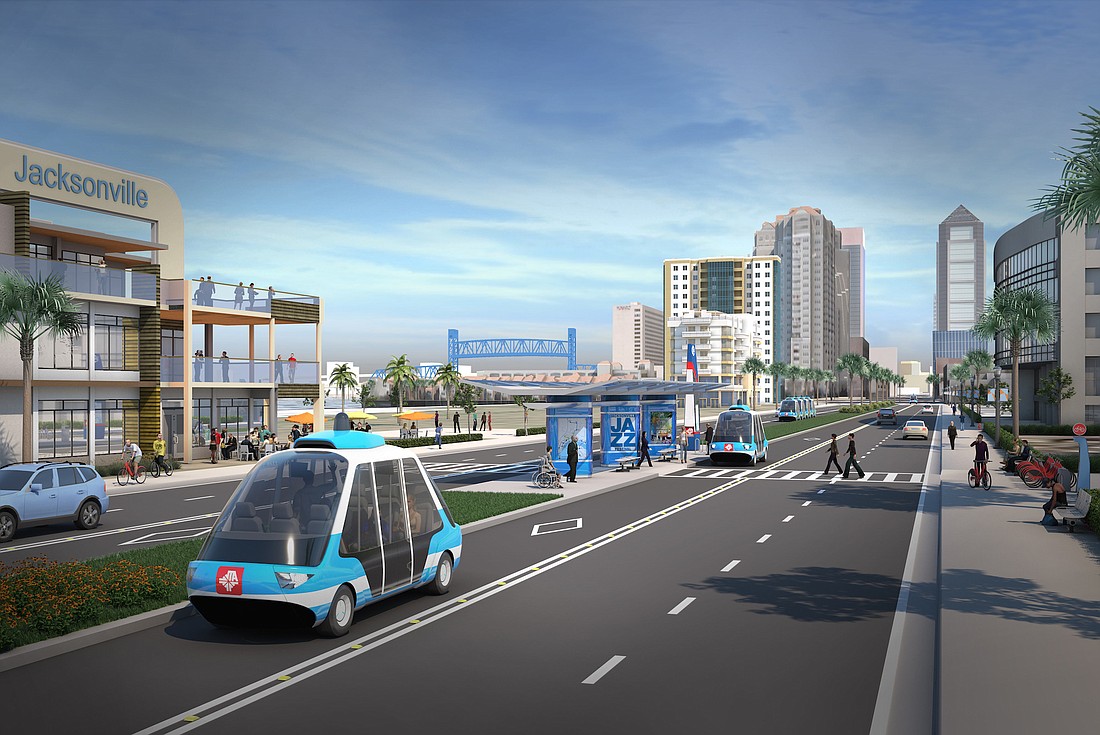
City lawmakers cut $132 million from the Jacksonville Transportation Authority’s Downtown Skyway modernization in a proposal to increase and extend Duval County local option gas tax.
The Jacksonville City Council voted 16-2 on May 12 in favor of an amendment by Ron Salem to reduce money for the JTA project in Ordinance 2021-0223.
The amendment was added during the Council Committee of the Whole meeting and is the first substantive change to Mayor Lenny Curry and JTA’s proposed Duval County gas tax increase from 6 cents to 12 cents per gallon.
The bill also would extend the current gas tax through 2046 to pay for $930.2 million in roadway, drainage and transportation improvements with the revenue
Salem’s amendment leaves $247 million for what JTA calls the Ultimate Urban Circulator. The transportation authority wanted $379 million for the project.
JTA CEO Nathaniel Ford said the money would be used to remove the rail on the Skyway’s elevated track and convert it for use by automated driverless vehicles.
Ford told Council members his team will lobby Washington, D.C., officials and private investors for the $132 million to complete the U2C’s 10-mile system into urban core neighborhoods.
After the meeting, Ford said the existing elevated track conversion is the “heaviest lift” and the money remaining in the bill for U2C will show local buy-in to receive federal matching dollars.
“We’re banking on ... our ability to complete projects, our reputation at the national level and the game-changing type of project we have that is attractive to federal funding,” Ford said.
Council members LeAnna Cumber and Brenda Priestly Jackson voted against the amendment.
Cumber, a critic of JTA’s automated mass transit proposal, said May 12 she might support the gas tax bill if it did not commit money to the U2C
“We can debate the veracity of the gas tax and the projects in the (capital improvement plan),” Cumber said.
“But I cannot support putting a dime to the Skyway. I think all of our constituents would be upset if we throw $240 million of their hard-earned money into that and we’re struggling to do septic tanks.
“It is, to me, pure insanity.”
Salem’s amendment also commits JTA to the project list it filed with the legislation, and the transportation authority would be required to return to Council for project cost overruns or to reappropriate its portion of the gas tax revenue.
Curry officials said May 12 that city public works projects filed with the bill are eligible by state statute but will not be authorized by the gas tax legislation.
The gas tax revenue can be used only on those projects when approved in the city’s annual budgets, according to the mayor’s office.
Out of time
Council ran out of time in the three-hour meeting to address the other bill on the agenda, Ordinance 2021-0235. It would borrow $100 million over two years to remove nearly 22,000 aging septic tanks and connect underserved neighborhoods to city sewers.
Curry officials said the gas tax revenue could free up to $300 million over 30 years in the city general fund.
Cumber suggested that $343 million of what Duval County expects from the $1.9 trillion federal American Recovery Act be used for septic tank removal.
Curry officials said the COVID-19 assistance might be needed to cover revenue losses in the local bed tax, city-run sporting venues and to meet other budget needs.
Several Council members told Curry Chief of Staff Jordan Elsbury they wanted a list of projects that could be funded by the $200 million remaining after the septic tank appropriation.
Curry officials said May 12 the general fund dollars could also be used for park improvements and Downtown infrastructure work like completing the Riverwalk.
“This has always been about mass creation of jobs, fulfilling promises and improving quality of life for not only our most vulnerable citizens, but all of our citizens in every corner of this county,” Elsbury said.
“Clearing decades of infrastructure backlogs will bring relief to our capital improvement plan.”
More changes
Council left nine amendments unaddressed May 12.
Two amendments from Cumber would further restrict how JTA could use its portion of the gas tax revenue.
Her proposed amendments limit JTA to road projects, maintenance, green bike lanes, the existing bus service and St. Johns River Ferry capital and operations, effectively eliminating the U2C from the bill.
Council member Matt Carlucci’s amendment to take the $132 million removed from the U2C budget and reallocate it to the 30-mile Emerald Trail network likely will be the first for a vote at the next Committee of the Whole meeting May 19.
Council member Al Ferraro proposed an amendment to put the gas tax increase on the August 2022 General Election Primary ballot.
It remains unclear if Curry and JTA will have the 11 Council votes needed to pass the tax increase.
Hazouri said he wants a first vote on the full bill May 19 with a final vote May 25, but not all of the 19 Council members agree.
Council members Danny Becton called it “hypocritical” to make final changes to the bill before lawmakers complete town hall meetings to hear from Duval County citizens and gather public opinion.
Hazouri left open the ability to hold a special Council meeting to take the final vote on the gas tax after May 25.